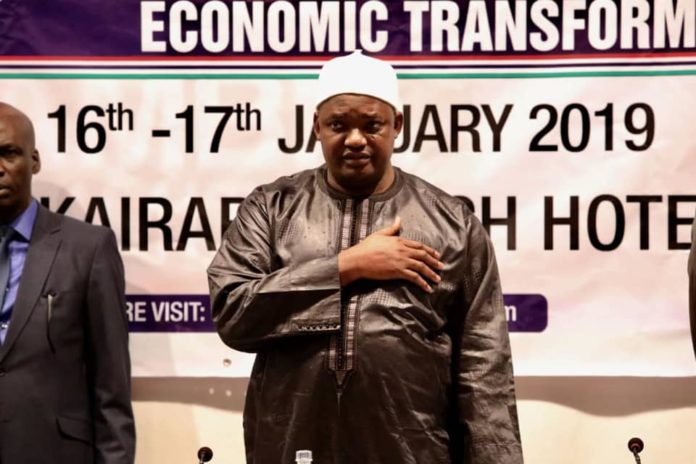By Lamin Njie
The caste-generated feelings of deep-seated animosity between members of some communities in the Upper River Region district of Kantora have led to the deaths of two people in a twelve-month period.
A fortnight ago, the nation woke up to the news of an outbreak of another caste-related violence in the Upper River Region this time in Koina in which houses were set ablaze and properties vandalised. The police in the region have rounded up and detained nearly two dozen people suspected of involvement in the rampage.
But what is the Barrow administration doing to bring an end to this caste madness in Kantora? Well, according to the chairman of Koina Village Development Committee, Mr Saikou Samura, the Gambian authorities are not keen in the maintenance of peace between members of Koina’s various social rungs.
“Deeply concerned and perturbed by the deepening caste-related problems, the Alkalo and Imam of Koina despatched a mission to governor Fatou Jammeh in Basse for immediate intervention. Fatou Jammeh sent up to three letters to Lamin Dibba who was then minister of local government for government intervention in the caste issue. But up to his [Dibba] time of leaving office, nothing has been done about the issue,” Samura tells The Fatu Network over the weekend.
Koina in the upper reaches of The Gambia is one of very few communities that boasts of a school, health facility and other social amenities through the sweats and toils of her citizens. Through community self-help initiatives, Koina has succeeded in building a school that is catering to the educational needs of her children as well as a health facility that is reducing mortality rate in that part of the country. Citizens of Koina, spread across the world, pride themselves in bringing development to their home through collective, communal efforts. The one thing though that helped Koina come this far in terms of development is the fact that the people have peacefully co-existed for over 200 years.
Located 500km from the Gambian capital Banjul, Koina is a promising, growing settlement with over ten thousand residents. However, the growing feeling of deep-seated animosity between the so-called freeborns and slaves is seriously threatening the peace in which members of the community enjoy.
Visiting the remote settlement over the weekend, The Fatu Network find that there is more to the recent clash in Koina than meets the eye. A security issue deserving national attention, Koina caste problem is a combination of complex factors from tradition to economics.
The Fatu Network traced the recent clash largely to a sustained campaign for ‘equality’ in the predominantly farming community. Gambana, a Serahule world with the English equivalent of We Are All One, has been synonymous with a persistent struggle for freedom in Koina. In schools and other public places, the word Gambana is written everywhere and this has not gone down well with all residents of Koina.
It was little over two weeks when Muhammad Krubally went to the town’s mosque during the dusk prayers with a cap on which Gambana had been printed. But according to some worshippers, when they saw Krubally walked into the town mosque with the Gambana writing, it became evident that he was shooting for trouble. He was immediately hauled over by a group of worshippers and taken to the house of the Imam of the town and manhandled before been rescued by the police.
But why has Gambana become such an emotive term in Koina to the extent of arousing feelings that can lead to destruction of properties and injuries?
According to narrations of some supporters of Gambana movement, the word Gambana has come to be popularly used not only in Koina but also in some communities in the Upper River Region(URR) and beyond, to agitate for the abolishment of the term slave inherited by generations due to social arrangement.
“We became emboldened to wear Gambana T-shirts and materials when we realised that the so-called freeborns are irritated by it. It exasperates them because they don’t want to break away with the tradition of calling us slaves,” Haji Keita of so-called slave status tells The Fatu Network.
He adds: “It then metamorphosed into a sustained campaign for the abolishment of the slave label tagged on us. You can find it [Gambana] written everywhere in the town now.”
Some members of the so-called freeborns of Koina rejected the notion of Gambana, saying no-one is treating anyone inferior and therefore Gambana had no place in the community ‘only to ignite mistrust.’
Be as it may, the caste-related problem in Koina and other villages and towns in URR requires a drastic surgery for the security and safety of communities.
The Fatu Network made efforts for either the minister of information of The Gambia Ebrima Sillah or the spokesperson of the government Ebrima Sankareh to speak on the issue but none was able to give us an interview. Ebrima Sillah did not answer calls neither did he respond to a text message. The Fatu Network visited his office on Tuesday June 11 and left a message with his secretary. The secretary returned to us the following day saying the minister told her she should tell us he was busy. Ebrima Sankareh on the part told The Fatu Network he was travelling out of the country and will be unavailable for two weeks.
Editor’s note: Momodou Justice Darboe contributed to this story




